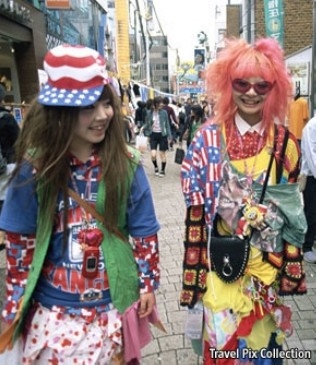
Business Branding Japan as "cool" No limits, no laws
商業 日本貼上"酷"標簽 日本文化要大展拳腳
The beautiful people join hands with the bureaucrats
潮人聯手官員共同推進"酷日本"
THE Tokyo headquarters of Japan's Ministry of Economy, Trade and Industry (METI) was the cockpit for the country's post-war economic miracle.
坐落于東京本部的日本經濟產業?。∕ETI)在戰后的經濟奇跡中扮演了急先鋒的角色,如今卻墨守成規,不復當年勇。
But these days it is a stodgy place. The decor barely brightens even when you enter the offices of "The Cool Japan Promotion Strategy Programme".
即使走進"酷日本推廣戰略項目"辦公室,室內裝飾也讓人打不起精神。
There is not an Apple MacBook in sight, and demure "office ladies" still serve the tea.
屋里看不到蘋果筆記本電腦,看到的是死氣沉沉的白領麗人們依舊在端茶倒水。
But METI wants to let its hair down.
可METI想一改嚴肅的面孔。
With the former bastions of Japan's economy, such as cars and electronics, facing stiff competition from South Korea, China and elsewhere,
像汽車,電子這些一度是日本經濟堡壘的產業,正面對韓國,中國等國的激烈競爭。
it is looking for alternative sources of growth in so-called creative industries, such as fashion, music, food and anime (cartoons).
日本把目光轉向了所謂的創意產業,比如時尚,音樂,食物和卡通,以此作為經濟增長的另一個來源。
The search has become more intense since March 11th when a nuclear accident battered Japan's image abroad.
自從3月11日的核事故發生之后,日本在海外的形象大打折扣,
(So blanket was the repudiation, according to Interbrand, a consultancy, that it hurt even Hyundai, a South Korean car firm sometimes mistakenly thought to be Japanese.)
(咨詢公司Interbrand稱,日本的聲譽受到的損害如此之大,連有時被誤認為日本公司的韓國汽車制造商現代公司都受其拖累)
"We have to rebrand Japan," says METI's Tetsuya Watanabe.
因此對"酷日本"的探索也緊鑼密鼓起來,"我們要重塑日本,"
He describes March 11th as a "boiling-frog" moment—when Japan suddenly woke up to its industrial decline.
來自METI的澈夜渡邊如是說,他把3.11當作"沸水青蛙",從這個轉折點——日本猛然意識到自己日漸衰落的工業。
The aim is to spur a nearly fivefold increase in cultural exports by 2020, to ¥11 trillion ($140 billion)—almost as much as Japan earns from car exports.
此項目旨在到2020年,刺激文化出口達11萬億(1400億美元),相當于現在的5倍——與日本汽車出口相差無幾。
In the hands of civil servants, the plans for this are not exactly zinging.
在官員的監督下,這個項目并非那么隨心所欲。
One milestone in the Cool Japan campaign is, bewilderingly, a gathering of the IMF and World Bank in Tokyo next year.
"酷日本"活動一個里程碑事件是明年是IMF和World Bank 將聚首東京,此舉讓人摸不著頭腦。
Yet young Japanese designers, artists, chefs and pop stars have flocked to it—not despite METI's involvement, but because of it. Takashi Koyama, a fashion designer, says Japan's hottest trendsetters are too niche to expand abroad on their own.
目前年輕的日本設計師,藝術家,廚師以及流行明星們對"酷日本"項目可謂蜂擁而至——不是為了響應METI的號召,而是一心為了提高日本的知名度。
Without METI's clout, he says, they would be copied by cheaper South Korean rivals, who have expanded abroad more aggressively in recent years.
設計師高司木山說,日本最潮的東西都過于小眾化,僅憑一己之力難以擴散到國外。
He says that March 11th was a wake-up call to Japan's creative industries, too.
要是沒有METI的支持,潮流產品就會被近年來文化輸出勢頭迅猛的對手韓國"山寨"。
"If we don't go abroad, we will perish," he says.
他還說3?11對日本的創意工業也是個警醒,如果不走出島外,這個產業就將消亡。
On October 7th 14 small Japanese labels, supported by METI, kicked off the Cool Japan campaign by opening a temporary store in Singapore called Harajuku Street Style, named after Tokyo's edgy fashion district (pictured).
10月7日,由METI扶持的14家日本小品牌,在新加坡開了一家試營店,名叫"原宿街風情",以東京的潮流時尚聚集地命名。
The aim was not just to promote Japanese brands, says Mr Koyama.
(見圖)"酷日本"活動也由此拉開序幕。
It was to promote the "atmosphere" of fashion in Japan, a what-the-heck attitude to mixing items and styles of clothing.
木山說這不僅是為了提升日本品牌的知名度,也是為了宣揚日本時尚的氛圍,對衣服搭配隨心所欲的一種怡然自得的態度。
"No rules, no regulations," is how he describes this.
"沒有規矩,沒有限制,"木山這樣描述到。
If only Japan's economic policymakers would apply that dictum more widely
要是日本的經濟決策者在制定決策時能"沒有規矩,沒有限制",少一些條條框框就好了。











